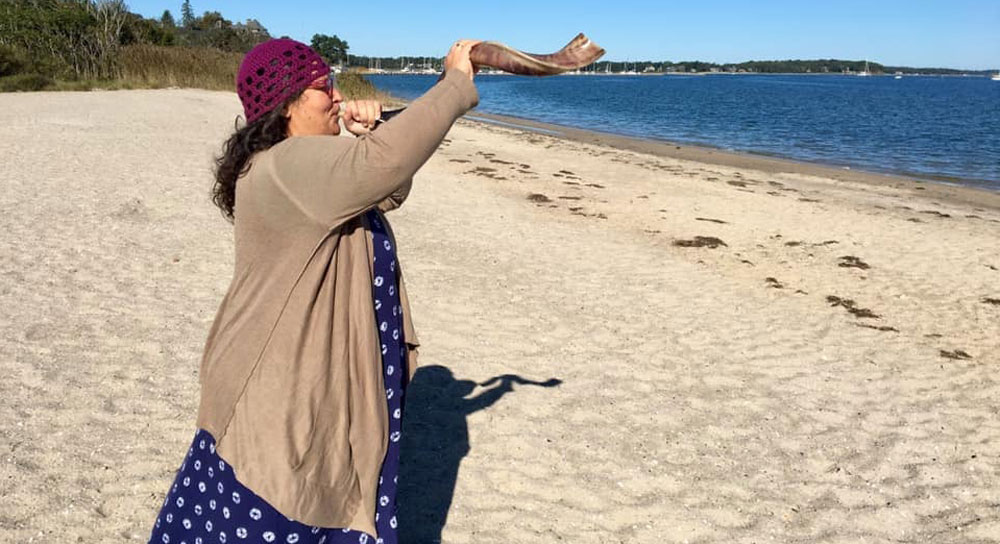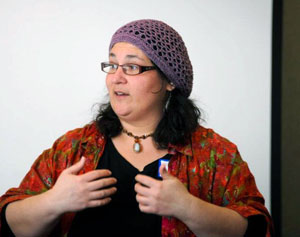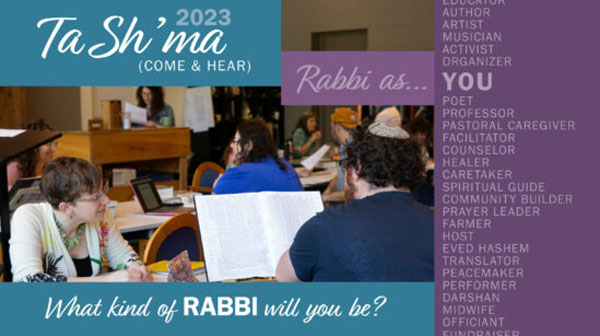News Highlights Fat Torah: Rabbi Minna Bromberg Roots Her Work as a Fat-Liberation Activist in Torah

For Fat Torah founder Rabbi Minna Bromberg `10, fat activism is an issue of human worth. “I don’t think this has to be framed religiously, but Judaism does have a lot to say about every single person’s inherent and immeasurable worth. As a fat rabbi and activist, I love knowing that, with its abundance of rich teachings on what it means to be a human being created in the image of the Divine, my tradition ‘has my back,’” she said.
While Bromberg, who moved to Israel in 2014, had been involved in fat activism since the early 1990s, she says it “snuck into her rabbinate” in small ways after being ordained at Hebrew College Rabbinical School. She was looking for more ways to help end weight stigma in Jewish communal life when she was inspired by some sufganiyot—traditional jelly-filled fried doughnuts! “The catalyst for ‘going bigger’ happened in 2020 at my daughter’s synagogue pre-school Chanukah party where I heard a song leader tell a bunch of three and four-years-olds who were enjoying traditional Chanukah fried foods that it was time for them to get back to dancing ‘unless you’ve gotten too fat from those sufganiyot.’” Bromberg recalls that in that moment, she realized that keeping quiet about her own fat-liberatory approach to Judaism (and deeply Jewishly informed approach to fat liberation) was not serving anyone.

Fat Torah has an international following—something Bromberg cultivates as she encounters weight stigma in the United States and her homeland of Israel. “Despite the stereotype of Israelis being more ‘up in each other’s business’ than Americans—I personally experience about the same number of complete strangers commenting on my body here as I have in most places I’ve lived in the States. I think this actually says something about how bad the fatphobia is in the U.S. People who do not have a cultural tendency to talk to strangers nonetheless feel compelled to give me their unsolicited opinions about my body and/or my eating.”
Fat Torah has attracted a lot of press, including articles in The Forward, Tablet Magazine, The Times of Israel, Kveller to several national podcasts. And most recently, Bromberg contributed to Routledge’s Contemporary Reader of Gender and Fat Studies with her article “Your belly is a heap of wheat: a Torah of fat liberation.” The chapter invites readers to bring their whole selves— body, heart, mind, and soul —to embrace the spiritual and religious traditions that are their birthright. (The book is free and open access.)
In addition to her writings, Fat Torah creates Jewish fat liberation space in their Facebook group of over 1,000 members, teaches workshops at dozens of synagogues, Hillels, and rabbinical schools, and spreads “fat-lib” activism through blogging, podcasts, and social media.
Bromberg has even composed a “Fat Torah Manifesto”—a riff on fat liberation’s radical beginnings—which includes the demands that we end weight stigma in Jewish communal life and train Jewish professions to “confront fatphobia wherever they encounter it (including in themselves).”
Rabbi Bromberg has led several Hebrew College Open Circle Jewish Learning Social Action classes including, ‘Fat Torah Beit Midrash,’ and ‘From Narrowness to Freedom: Preparing for Passover with Fat Torah.” Learn more about Fat Torah at fattorah.org and see how other Hebrew College Rabbinical School alumni describe their innovative rabbinates here.
Interested in becoming a rabbi or cantor? Join us for one of our November Open Houses (in-person Nov. 13 and online Nov. 19). Learn more here.


